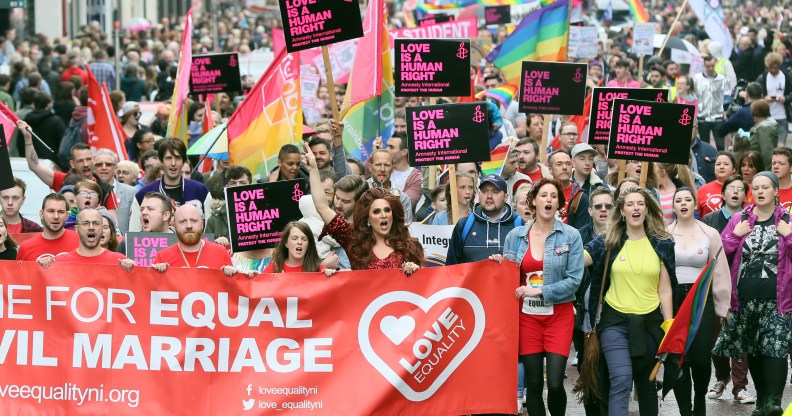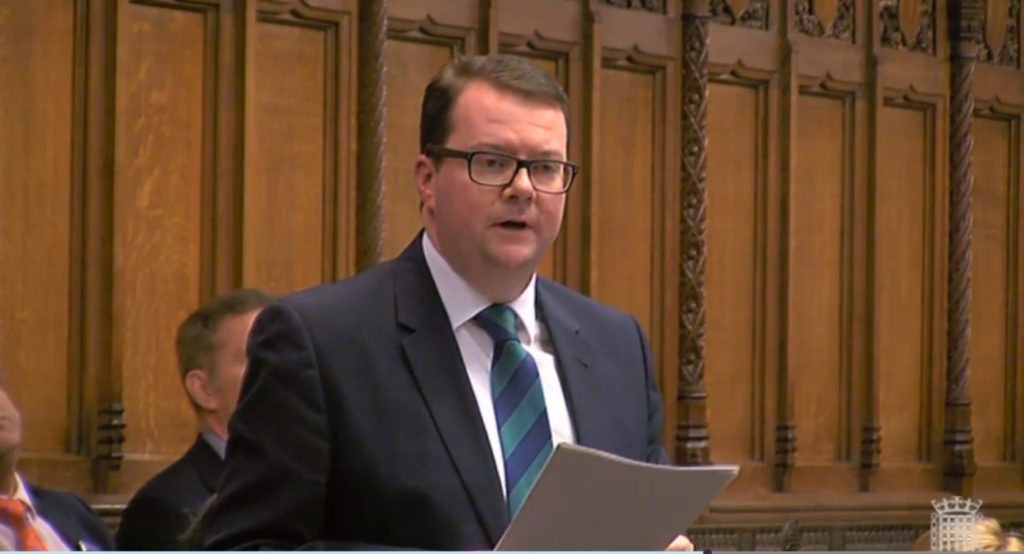Northern Ireland equal marriage bill gets final approval from Parliament

Equal rights campaigners take part in a march through Belfast on July 1, 2017 to protest against the ban on same-sex marriage. (PAUL FAITH/AFP/Getty)
MPs have given final approval to a bill that will extend same-sex marriage and abortion rights to Northern Ireland, in the absence of a devolved government.
The Northern Ireland (Executive Formation) Bill cleared its final stage in Parliament on Monday (July 22), after an equal marriage amendment tabled by Labour MP Conor McGinn gained the approval of both the House of Commons and House of Lords.
The amended bill, which will now head to the Queen for royal assent, will extend same-sex marriage to Northern Ireland by January 2020, provided that power-sharing in the region is not restored beforehand.
Love wins: Northern Ireland campaigners celebrate equal marriage bill passing
Northern Irish LGBT+ campaigners, who came together as the Love Equality coalition to press for the bill, celebrated the news.
John O’Doherty, director of Northern Ireland LGBT+ charity The Rainbow Project, said: “Love wins! Today that message rang out from Westminster.
“Unless there is a return of assembly by October, in January 2020 same sex couples will be able to get married or have their civil partnership upgraded – and I and my partner plan to be one of the first in line.”
This win means so much to couples and families like mine, who to date have not been recognised as equals by our government.
Cara McCann, director of LGBT+ organisation HereNI, added: “With relentless positivity, we changed hearts and minds, brought more people to the LGBT civil rights movement and helped platform equal marriage as the rights issue of our generation.
“This win means so much to couples and families like mine, who to date have not been recognised as equals by our government.
“Today, we have ensured that those days of discrimination are now coming to an end.”

Labour MP Conor McGinn led efforts to secure the Northern Ireland equal marriage amendment
Patrick Corrigan of the Love Equality coalition said: “Following the collapse of the Northern Ireland Assembly, we brought our campaign to Downing Street.
“When the Prime Minister refused to legislate, we brought our campaign to Parliament and built a broad and deep coalition of support among backbench MPs and Peers.
“Today that painstaking campaign is coming to a successful conclusion.
“We pay tribute to Conor McGinn MP and Lord Robert Hayward who have spearheaded our campaign in Westminster, and all the MPs and Peers who voted ‘yes’ to equality for the LGBT+ community in Northern Ireland.
“We thank everyone who has supported our campaign across these islands, who have marched, petitioned, lobbied and fundraised to get us to today when we can finally say Love Wins.”
‘Step towards full equality’ for LGBT+ people
The original government bill was initially intended to extend the deadline for a fresh power-sharing agreement in the region, which has been without a devolved government since January 2017.
However, MPs voted by 383-73 to add an amendment from Northern Ireland-born Conor McGinn on July 9.
McGinn, who won Politician of the Year at 2018’s PinkNews Awards for his work on the issue, said on Monday: “This historic vote means that in just a few months, LGBT people will able to marry in Belfast just as they already can in Cardiff, Edinburgh, London or Dublin.
“It is a good day for equality, politics and, most of all, love.”
Nick Herbert MP, Chair of Parliament’s APPG on Global LGBT+ Rights, said: “People in Northern Ireland simply have not had the same rights as those in the rest of the United Kingdom.
“Today we celebrate another step towards full equality for all LGBT+ people in the UK.”
Stonewall co-founder Lord Cashman said: “I commend all the tireless campaigners who have for years raised their voices, as well as Peers and MPs who have continuously voted to ensure LGBT+ people in Northern Ireland will enjoy the same rights as the rest of the UK.”

